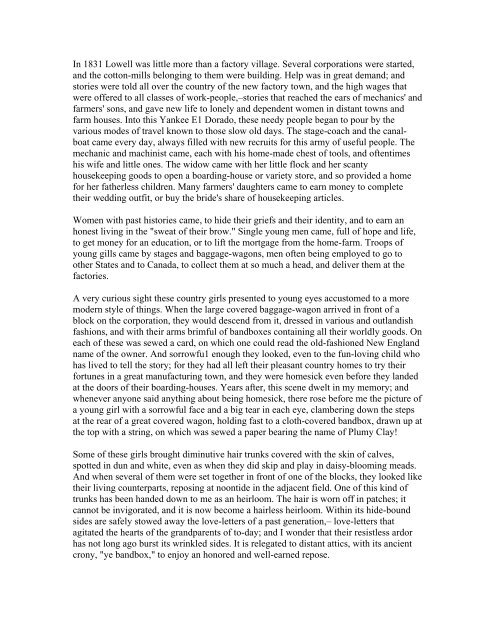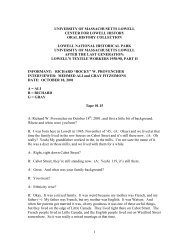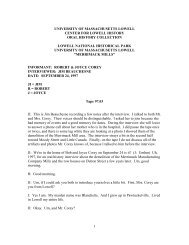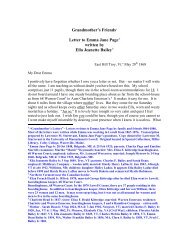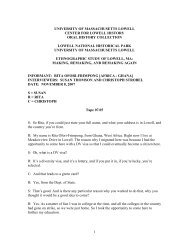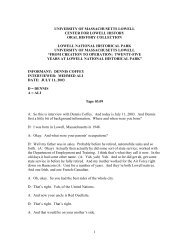LOOM AND SPINDLE OR Life Among the Early Mill Girls WITH A ...
LOOM AND SPINDLE OR Life Among the Early Mill Girls WITH A ...
LOOM AND SPINDLE OR Life Among the Early Mill Girls WITH A ...
Create successful ePaper yourself
Turn your PDF publications into a flip-book with our unique Google optimized e-Paper software.
In 1831 Lowell was little more than a factory village. Several corporations were started,<br />
and <strong>the</strong> cotton-mills belonging to <strong>the</strong>m were building. Help was in great demand; and<br />
stories were told all over <strong>the</strong> country of <strong>the</strong> new factory town, and <strong>the</strong> high wages that<br />
were offered to all classes of work-people,–stories that reached <strong>the</strong> ears of mechanics' and<br />
farmers' sons, and gave new life to lonely and dependent women in distant towns and<br />
farm houses. Into this Yankee E1 Dorado, <strong>the</strong>se needy people began to pour by <strong>the</strong><br />
various modes of travel known to those slow old days. The stage-coach and <strong>the</strong> canalboat<br />
came every day, always filled with new recruits for this army of useful people. The<br />
mechanic and machinist came, each with his home-made chest of tools, and oftentimes<br />
his wife and little ones. The widow came with her little flock and her scanty<br />
housekeeping goods to open a boarding-house or variety store, and so provided a home<br />
for her fa<strong>the</strong>rless children. Many farmers' daughters came to earn money to complete<br />
<strong>the</strong>ir wedding outfit, or buy <strong>the</strong> bride's share of housekeeping articles.<br />
Women with past histories came, to hide <strong>the</strong>ir griefs and <strong>the</strong>ir identity, and to earn an<br />
honest living in <strong>the</strong> "sweat of <strong>the</strong>ir brow." Single young men came, full of hope and life,<br />
to get money for an education, or to lift <strong>the</strong> mortgage from <strong>the</strong> home-farm. Troops of<br />
young gills came by stages and baggage-wagons, men often being employed to go to<br />
o<strong>the</strong>r States and to Canada, to collect <strong>the</strong>m at so much a head, and deliver <strong>the</strong>m at <strong>the</strong><br />
factories.<br />
A very curious sight <strong>the</strong>se country girls presented to young eyes accustomed to a more<br />
modern style of things. When <strong>the</strong> large covered baggage-wagon arrived in front of a<br />
block on <strong>the</strong> corporation, <strong>the</strong>y would descend from it, dressed in various and outlandish<br />
fashions, and with <strong>the</strong>ir arms brimful of bandboxes containing all <strong>the</strong>ir worldly goods. On<br />
each of <strong>the</strong>se was sewed a card, on which one could read <strong>the</strong> old-fashioned New England<br />
name of <strong>the</strong> owner. And sorrowfu1 enough <strong>the</strong>y looked, even to <strong>the</strong> fun-loving child who<br />
has lived to tell <strong>the</strong> story; for <strong>the</strong>y had all left <strong>the</strong>ir pleasant country homes to try <strong>the</strong>ir<br />
fortunes in a great manufacturing town, and <strong>the</strong>y were homesick even before <strong>the</strong>y landed<br />
at <strong>the</strong> doors of <strong>the</strong>ir boarding-houses. Years after, this scene dwelt in my memory; and<br />
whenever anyone said anything about being homesick, <strong>the</strong>re rose before me <strong>the</strong> picture of<br />
a young girl with a sorrowful face and a big tear in each eye, clambering down <strong>the</strong> steps<br />
at <strong>the</strong> rear of a great covered wagon, holding fast to a cloth-covered bandbox, drawn up at<br />
<strong>the</strong> top with a string, on which was sewed a paper bearing <strong>the</strong> name of Plumy Clay!<br />
Some of <strong>the</strong>se girls brought diminutive hair trunks covered with <strong>the</strong> skin of calves,<br />
spotted in dun and white, even as when <strong>the</strong>y did skip and play in daisy-blooming meads.<br />
And when several of <strong>the</strong>m were set toge<strong>the</strong>r in front of one of <strong>the</strong> blocks, <strong>the</strong>y looked like<br />
<strong>the</strong>ir living counterparts, reposing at noontide in <strong>the</strong> adjacent field. One of this kind of<br />
trunks has been handed down to me as an heirloom. The hair is worn off in patches; it<br />
cannot be invigorated, and it is now become a hairless heirloom. Within its hide-bound<br />
sides are safely stowed away <strong>the</strong> love-letters of a past generation,– love-letters that<br />
agitated <strong>the</strong> hearts of <strong>the</strong> grandparents of to-day; and I wonder that <strong>the</strong>ir resistless ardor<br />
has not long ago burst its wrinkled sides. It is relegated to distant attics, with its ancient<br />
crony, "ye bandbox," to enjoy an honored and well-earned repose.


